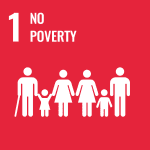GOAL 1: DEFEAT POVERTY
 “End all forms of poverty in the world”
“End all forms of poverty in the world”
Tourism is the fastest growing sector in the world. It enables economic development at all levels, generating wealth through job creation. Developing tourism in a sustainable way can have a great impact on communities and be functional to national objectives aimed at reducing poverty, promoting entrepreneurship, supporting small businesses and encouraging the weakest categories, such as young people and women.


 “End hunger, achieve food security, improve nutrition and promote sustainable agriculture”
“End hunger, achieve food security, improve nutrition and promote sustainable agriculture” “nsuring health and wellbeing for all and for all ages”
“nsuring health and wellbeing for all and for all ages” “Ensure quality, equitable and inclusive education, and promote lifelong learning opportunities for all”
“Ensure quality, equitable and inclusive education, and promote lifelong learning opportunities for all”  “Achieving gender equality and empowerment (greater strength, self-esteem and awareness) of all women and girls”
“Achieving gender equality and empowerment (greater strength, self-esteem and awareness) of all women and girls” “Ensuring the availability and sustainable management of water and sanitation facilities for all”
“Ensuring the availability and sustainable management of water and sanitation facilities for all” “Ensuring access to affordable, reliable, sustainable and modern energy systems for all”
“Ensuring access to affordable, reliable, sustainable and modern energy systems for all” “Encourage lasting, inclusive and sustainable economic growth, full and productive employment and decent work for al”
“Encourage lasting, inclusive and sustainable economic growth, full and productive employment and decent work for al”  “Building resilient infrastructure and promoting innovation and fair, responsible and sustainable industrialisation”
“Building resilient infrastructure and promoting innovation and fair, responsible and sustainable industrialisation” “Reducing inequality within and between nations”
“Reducing inequality within and between nations” “Making cities and human settlements inclusive, safe, durable and sustainable”
“Making cities and human settlements inclusive, safe, durable and sustainable” “Ensuring sustainable production and consumption models”
“Ensuring sustainable production and consumption models” “Take urgent measures to combat climate change and its consequences”
“Take urgent measures to combat climate change and its consequences” “Conserving and sustainably using oceans, seas and marine resources for sustainable development”
“Conserving and sustainably using oceans, seas and marine resources for sustainable development”  “Protecting, restoring and promoting sustainable use of the Earth’s ecosystem, sustainably managing forests, combating desertification,
“Protecting, restoring and promoting sustainable use of the Earth’s ecosystem, sustainably managing forests, combating desertification, “Promote peaceful and more inclusive societies for sustainable development; offer access to justice for all and create efficient, accountable and inclusive bodies at all levels”
“Promote peaceful and more inclusive societies for sustainable development; offer access to justice for all and create efficient, accountable and inclusive bodies at all levels”  “Strengthening the means of implementation and renewing the global partnership for sustainable development”
“Strengthening the means of implementation and renewing the global partnership for sustainable development”